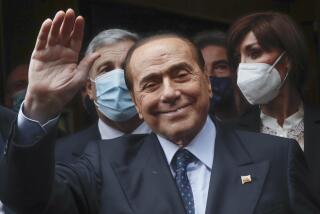Confounds Pundits Who Expected Quick Fall : Italy’s Goria: Unexpected Staying Power
- Share via
ROME — Giovanni Goria, the bearded provincial technocrat who came to power because of a political deadlock, is proving the critics who thought he would be another revolving-door prime minister to be wrong.
This week, as observers noted with perplexity that 100 days had passed since he was asked to form a government, Goria was feeling confident enough about his future to schedule state visits to Greece in November and to the United States in December.
Goria’s agenda in Washington will include disarmament and its impact on the Atlantic Alliance, East-West issues, the Persian Gulf, international economics and Central American peace prospects.
His aides talk confidentially of additional travel next year--to Asia, Africa and Latin America.
Uncertainty of Summer
This is a far cry from the uncertainty of early summer. Some observers thought then that Goria’s government, Italy’s 47th since World War II, would be measured in days, or weeks at best.
Goria himself has not had much to say about his prospects for staying in power, for although the accountant-politician has achieved some popularity, he has not managed to build much of a power base.
At 44, Goria is one of Italy’s youngest prime ministers ever--and also its first bearded one. But he is a scarred veteran of a political arena renowned for slippery alliances and back-room mischief.
He told an Italian interviewer: “It hasn’t been easy sailing. ‘Man proposes, God disposes.’ The proverb has never been so true. My government was born without a true political majority. . . . It’s an anomaly and can serve in a transitory phase.”
Goria, who likes soccer and billiards, who has quit smoking and has an incipient paunch to prove it, heads a fractious five-party, center-left coalition yoked more by necessity than choice. A Christian Democrat who was minister of the treasury under Socialist Prime Minister Bettino Craxi, Goria rose to the top post after Craxi and Christian Democrat Ciriaco De Mita canceled each other out.
The Christian Democrats, as they have since World War II, finished first in last June’s elections, with about a third of the vote. The prospect of sharing power with the second-place Communists was as unthinkable as ever, so the Christian Democrats turned again to the Socialists and three smaller parties--the Republicans, Liberals and Social Democrats--as coalition partners.
Numerous Opponents
Goria presides but does not command. Craxi still thirsts for power, and De Mita is just one of a number of senior political figures in a faction-riven party, each of whom wants a government of his own. Goria is also a target for snipers on the left.
Developments have buffeted Goria from the outset of his tenancy as prime minister: a disastrous flood, a prison riot involving hostages, speculative pressure on the currency, an attack on an Italian merchant ship in the Persian Gulf.
Despite misgivings within his own party, Goria responded to the maritime incident by dispatching eight Italian navy vessels to the Persian Gulf--to the delight of the United States and the fury of the Communists.
Last month, an unexpected and seemingly minor spat with the Vatican over religious instruction in public schools nearly brought Goria down. Now he is soothing Italians alarmed by the potential domestic implications of the international stock market plunge.
Soon after taking office in July, Goria, whose forte is economics--he once headed a small bank in his native Asti, in the north--increased indirect taxes in an effort to reduce the swelling budget deficit. Now he is promising continued growth and low inflation for next year.
Goria lacks both the authority and the mandate to embark on overdue political and economic structural reforms, but he does seem to have won some breathing space.
The Parliament will debate the budget next month, and there will be national referendums on judicial reform and whether to restrict the use of nuclear power, but none of these seems incendiary enough to topple the Goria government.
The political consensus appears to be that Goria’s real strength is his weakness: He is an acceptable, non-threatening transitional figure at a time when established power brokers are stalemated. For that reason, the thinking goes, he may be around a lot longer than most people expected. Most observers believe he will be prime minister at least until after his party’s annual convention next spring.
More to Read
Sign up for Essential California
The most important California stories and recommendations in your inbox every morning.
You may occasionally receive promotional content from the Los Angeles Times.













